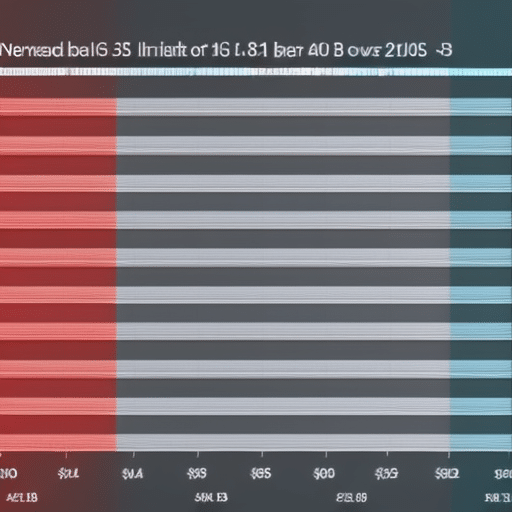
Bitcoin Price Forecast Analysis
Bitcoin has become one of the most talked-about topics in recent years, as its value has skyrocketed and plummeted with breathtaking speed. Like a roller coaster, it can be thrilling for those with the stomach to ride, but also intimidating and risky for many. This article will delve into the current forecast for Bitcoin’s price, as well as explore some of the factors that could affect it going forward. By examining Bitcoin’s potential impact on the global economy and its role in the financial system, readers will gain a better understanding of how to approach investing in this cryptocurrency. Key Takeaways Bitcoin price forecast is uncertain due to its volatility and the influence of various factors such as mining rewards, economic factors, political events, and technological advancements. Government regulations and policies play a significant role in impacting investor confidence and the price of Bitcoin. Bitcoin’s potential for growth is still high despite its volatility, and technological developments are crucial for accurate price forecasts. Bitcoin’s decentralization, lack of regulation, and potential to revolutionize global economic dynamics make it a hedge against inflation and disruption, but also come with security risks and irreversible transactions. Overview of Bitcoin Bitcoin is a decentralized digital currency that has become increasingly popular in recent years due to its innovative technology and potential for financial growth. The mining industry plays an integral role in the production of new bitcoins, as miners work to unlock complex mathematical algorithms through blockchain technology. This validates transactions on the Bitcoin network while simultaneously providing a secure platform which can be used for trading. As more users join the Bitcoin network, this drives up demand and raises its value, making it an attractive investment opportunity. With greater demand comes higher prices, leading to speculation about what the current forecast for bitcoin’s price might be. The Current Forecast for Bitcoin’s Price Investigation into the current theory provides evidence that an assessment of the value may have a significant effect on its future trajectory. Cryptocurrency volatility, mining rewards, and other factors can significantly influence Bitcoin’s price. The following table outlines these different components and their respective effects: Component Effect Volatility Increases unpredictability in prices Mining Rewards Lowering of rewards over time leads to price decreases External Factors Macroeconomic events or geopolitical issues can cause drastic changes in prices The volatility of cryptocurrency, combined with the decreasing mining rewards and external factors all contribute to create an uncertain environment for predicting Bitcoin’s future prices. Therefore, it is important to explore what other factors could potentially impact Bitcoin’s price in order to make more informed predictions. Factors that Could Impact Bitcoin’s Price There are a number of factors which can affect the price of Bitcoin, including economic, political, regulatory and technological forces. Economic factors such as market volatility, public sentiment and currency exchange rates can significantly influence Bitcoin’s value. Political events like elections or legislation can also have an effect on the price since governments may decide to regulate or ban it. Regulatory bodies such as central banks also play a role in setting rules that guide cryptocurrency trading. Finally, technological advancements in blockchain technology could cause fluctuations in the market or even create new opportunities for investment. Economic factors Economic forces have a significant bearing on the value of Bitcoin. Monetary policies and consumer demand can substantially influence its price, as well as that of other currencies and commodities. For example, if a central bank reduces interest rates or increases the money supply, it could devalue fiat currencies like the US dollar relative to Bitcoin; conversely, an increase in borrowing costs or tightening of monetary policy might lead investors to move away from traditional assets into digital ones such as crypto-currencies. Similarly, changes in consumer sentiment towards crypto assets can also affect prices: if demand for Bitcoin rises due to increased acceptance by merchants or improved public opinion then this could drive up its price. On the other hand, negative news stories related to security breaches or financial scandals could cause people to sell their holdings and depress prices. As such, understanding how economic forces interact with each other is essential for making accurate predictions about future price movements. Political factors are another key determinant when it comes to forecasting Bitcoin’s value. Governments around the world have taken different approaches towards regulating digital currencies which can create uncertainty that affects investor confidence and therefore price levels. For instance, certain countries may choose to ban any purchases or sales involving cryptocurrency while others may impose taxes on these transactions; both scenarios can lead to reduced liquidity in markets where these regulations apply and consequently affect pricing behavior within them. Furthermore, government policies regarding anti-money laundering laws may also have an impact on trading activities since they establish rules that exchanges must follow when performing customer verification processes which has implications for transaction speed and cost efficiency. Thus, it is important for market participants to be aware of political developments when trying to predict future values of virtual coins like Bitcoin. Political factors Political forces are playing a crucial role in the development and evolution of digital currencies. Political instability, currency devaluation, capital controls, foreign exchange restrictions, and other government-related policies have a direct impact on the bitcoin market price. These factors can lead to decreased demand for cryptocurrencies due to economic uncertainty and lack of confidence in the traditional monetary system. For example, political turmoil in countries such as Venezuela has caused citizens to flock to bitcoin and other digital assets as a safe haven from inflationary pressures imposed by their respective governments. As such, it is critical that investors pay attention to how changes in global politics affect cryptocurrency prices when making investment decisions. In conclusion, political forces have an undeniable influence on the price of bitcoin and should be carefully considered when forecasting future movements in its value. This transition into regulatory factors is important because many governments across the world are beginning to recognize cryptocurrencies as legitimate financial instruments with accompanying rules and regulations that must be followed. Regulatory factors The political factors discussed previously can have a significant effect on the value of Bitcoin. In addition to these, regulatory factors must also be taken into consideration when forecasting the price of Bitcoin. Regulatory compliance and government oversight are two key elements that can influence the price. Regulatory bodies around the world are increasingly looking to understand how they should be regulating cryptocurrencies, with many governments deciding to implement stricter regulations in an effort to protect investors from fraudulent activity. It is important for individuals investing in cryptocurrencies to keep abreast of any regulatory changes that may affect their investments. In order for cryptocurrencies such as Bitcoin to remain viable and attractive investments, it is necessary for them to adhere to a certain level of regulatory compliance. As governments become more involved in understanding and regulating digital assets, they will undoubtedly have an impact on the value of Bitcoin and other cryptocurrencies as well. The next subtopic will explore how technological factors play a role in influencing the price direction of Bitcoin. Technological factors Technological developments can have a significant impact on the value of cryptocurrencies. The scalability and efficiency of blockchain technology is an important factor when it comes to predicting the future price of bitcoin. Blockchain scalability refers to its ability to handle increasing amounts of transactions per second while maintaining its security features, such as immutability and decentralization. Increasing the number of transactions per second requires more efficient mining operations, which can only be achieved through faster hardware, optimized algorithms, or larger blocks on the chain. This is a key concern in assessing bitcoin’s potential for long-term growth because miners are needed to secure the network and validate transactions. In addition, technological advancements have been made that allow for improved transaction speeds without having to increase block sizes or mining power. Lightning Network and SegWit are two examples that have improved Bitcoin’s scalability by allowing users to transact off-chain without sacrificing security. This has led many industry experts to believe that Bitcoin still has potential for further growth despite its current volatility in pricing due to increased demand from investors around the world. As such, technological developments will continue to play a major role in shaping Bitcoin’s future price movements and could potentially lead to more sustainable growth over time. Thus, understanding how these technological factors will affect Bitcoin’s price is essential for making accurate forecasts about its future performance in global markets. Potential Impact of Bitcoin on the Global Economy With the worldwide proliferation of Bitcoin, there is increasing speculation on its potential to revolutionize global economic dynamics. The growing social acceptance of cryptocurrency could potentially lead to higher volatility in the markets and create instability in the global economy. On one hand, Bitcoin has been seen as a hedge against inflation and economic crises; yet on the other, it could cause further disruption due to its decentralization and lack of government regulation. Additionally, the impact of Bitcoin on the financial system cannot be ignored. There are both positive and negative implications for how it can shape monetary policy and international transactions. In particular, it has huge implications for banking security systems, as well as remittance services that rely heavily on traditional financial networks. As such, understanding its role in a larger context will help inform policies that can ensure long-term stability while taking advantage of its potential benefits. As governments continue to struggle with regulating cryptocurrencies, they must carefully consider how its use can affect overall economic growth moving forward. Bitcoin’s Role in the Financial System The potential impact of Bitcoin on the global economy is undeniable. Already, it has been credited with revolutionizing the way money is exchanged and stored. However, its role in the larger financial system is just beginning to be understood. To understand its role in this context, it’s important to consider how Bitcoin interacts with other aspects of finance such as digital wallets and 3D printing. Digital wallets are a major part of the current cryptocurrency ecosystem because they provide users with a secure way to store their funds without worrying about theft or fraud. This makes digital wallets ideal for people who want to use cryptocurrencies but don’t have access to traditional banking services. Additionally, 3D printing provides opportunities for creating custom items that can be used as assets in various financial transactions. When combined with cryptocurrencies like Bitcoin, these tools make it possible for people to participate in global markets without relying on traditional banks or payment systems. As more people adopt these technologies, we will likely see an increased role for Bitcoin within the larger financial system. Impact of Cryptocurrency on Financial Markets Cryptocurrencies have presented a unique opportunity to bring new participants into the financial markets, allowing access to global markets without relying on traditional banking structures. The integration of artificial intelligence (AI) and blockchain technology has enabled digital wallets that can be used for trading cryptocurrencies, giving users unprecedented control over their finances. This has had a significant impact on the financial markets, with more individuals accessing opportunities previously unavailable to them. The ability to trade cryptocurrency using digital wallets has also allowed users to bypass traditional methods of payment such as banks or credit cards. This is because cryptocurrency transactions are made directly between two parties, allowing them to make payments quickly and securely without intermediaries taking commission fees. Furthermore, AI integration allows for automated trading systems that can make decisions based on market sentiment and data analysis in order to maximize returns in volatile markets. As a result, the impact of cryptocurrency on financial markets is undeniable and could potentially revolutionize the way individuals interact with global finance moving forward. Risk Management Strategies for Investing in Bitcoin Investing in Bitcoin can be a risky endeavor, and it is important to have an effective risk management strategy in place to maximize gains while minimizing losses. One of the primary components of mitigating risk when investing in Bitcoin is conducting a thorough assessment of the market and understanding how various factors affect its price. Additionally, portfolio diversification is essential for successful Bitcoin investments; this means spreading out investments across different types of currencies, exchanges, and assets. It also involves diversification between traditional markets and cryptocurrencies as well as short-term trading strategies and long-term investment plans. Taking these steps will help reduce volatility, protect against catastrophic losses, and provide more opportunities for profitable returns. With the right risk management strategies in place, investors can greatly increase their chances for success when investing in Bitcoin. Potential Benefits of Investing in Bitcoin Despite the risks associated with investing in Bitcoin, there are a number of potential benefits that can be derived from it: The decentralized nature of Bitcoin makes it an attractive asset for those seeking to diversify their portfolio and protect against traditional market speculation. By investing in Bitcoin, investors can benefit from its low transaction fees relative to other currencies and investments. Investing in Bitcoin provides social implications as well, as it has the potential to enable greater financial inclusion for those without access to traditional banking services around the world. The increased transparency provided by the blockchain technology underlying Bitcoin also offers potential advantages over more opaque investment opportunities such as stocks or derivatives trading. Overall, while there are risks associated with investing in Bitcoin, these are outweighed by the potential benefits that come with doing so if done correctly and responsibly. Nevertheless, understanding the limitations of this asset is just as important when considering its adoption into one’s portfolio. Limitations of Investing in Bitcoin Due to its decentralized nature, investing in Bitcoin has certain limitations that should be taken into consideration before committing funds. For example, due to its lack of regulation, the asset may be subject to higher volatility and speculative activity compared to more traditional investments. Moreover, network security is a considerable risk when it comes to Bitcoin investments as malicious actors may attempt to breach trading platforms or target individual investors. Additionally, trading platforms themselves present risks such as counterparty default or fraud thus increasing the vulnerability of investors’ assets. Furthermore, Bitcoin transactions are irreversible which can make refunds difficult for customers if they do not receive what they paid for from merchants. These limitations must be carefully weighed by potential investors so they can make an informed decision about whether investing in Bitcoin is right for them. Transitioning into the next section on potential investment strategies will help provide further understanding on how best to approach this potentially lucrative asset class. Potential Investment Strategies for Bitcoin Considering the volatile and speculative nature of Bitcoin, investors must be aware of various strategies to maximize potential gains while minimizing risks. For example, an investor can utilize alternative currencies such as Ethereum or Litecoin to diversify their portfolio, thus reducing the risk associated with investing in a single currency. Additionally, currency trading is another strategy that allows investors to buy and sell Bitcoin on a regular basis in order to capitalize on short-term price fluctuations. In this way, traders are able to take advantage of market movements without having to hold onto the asset itself for extended periods of time. To secure these investments, it is important for investors to understand how best to protect their holdings against cyber theft and other malicious activities. How to Secure Bitcoin Investments Investing in Bitcoin can be a great way to increase wealth, but it is important to ensure that the investment is secure. While potential investment strategies for Bitcoin can help investors maximize their profits, it is also important to understand how to protect investments from theft and fraudulent activity. The following steps should be taken to secure Bitcoin investments: Use strong passwords and two-factor authentication for all wallets and accounts associated with the Bitcoin investment; Utilize transaction fees and mining rewards when applicable; Monitor exchange rates regularly and know when to buy or sell. By taking these necessary security measures, investors can protect their Bitcoin investments from malicious activity while still enjoying the potential for increased wealth. With these protections in place, investors can confidently move on to consider tax implications of investing in bitcoin. Tax Implications of Investing in Bitcoin The taxation of Bitcoin investments is an important issue to consider for those hoping to maximize their potential returns. As with any investment, understanding the tax implications of investing in Bitcoin is key to creating optimal investment strategies and ensuring compliance with the law. Depending on where you live, how you acquire your Bitcoins and what type of investment you make, there can be different tax implications. For example, in the U.S., buying Bitcoins directly from a broker or exchange will generally be taxed as capital gains, whereas if they are earned through mining operations they may be subject to self-employment taxes. In other countries such as Germany, capital gains taxes may not apply until profits exceed 600 euros per year. It is important to research and understand local regulations before making any investments so that one can understand potential tax consequences associated with their specific circumstances. Understanding the tax implications of investing in Bitcoin is essential for investors looking to create effective investment strategies and remain compliant with applicable laws. With this knowledge in hand, it becomes possible to accurately assess the likelihood of achieving desired returns after accounting for all applicable taxes; this information can then inform future decisions about whether or not to invest in Bitcoin going forward. Having considered these items, it’s now time to turn our focus towards exploring the future of Bitcoin itself. The Future of Bitcoin As the cryptocurrency market continues to evolve, it is essential to gain an understanding of the possibilities and potential pitfalls associated with investing in Bitcoin. The future of Bitcoin is a complex topic that requires a comprehensive analysis. To better understand the landscape, it is important to consider both the aspects related to crypto mining and blockchain technology. The first consideration is crypto mining, which involves using computer processing power to solve complicated algorithms in order to validate transactions on the blockchain ledger. As miners verify more transactions, they are rewarded with newly-created coins, allowing them to increase their holdings and potentially turn a profit. Blockchain technology also plays an integral role in determining Bitcoin’s future prospects. This distributed ledger system ensures that all transactions are secure and immutable while also providing users with greater privacy protections than traditional forms of payment. Crypto Mining Blockchain Technology Uses computer processing power for validating transaction on blockchain ledger Distributed ledger system ensuring secure & immutable transactions as well as user privacy protection These two elements will continue to shape how Bitcoin develops in the coming years and could even affect its value. From this perspective, it is clear that there are still many unknowns when it comes to predicting what lies ahead for this emerging asset class; however, by taking into account these core components of cryptocurrency operations, investors can make more informed decisions about whether or not they should allocate capital into Bitcoin markets moving forward. Transitioning now into discussing the impact of bitcoin on the environment… Impact of Bitcoin on the Environment Exploring the environmental impacts of Bitcoin is essential to understanding the sustainability of this emerging asset class. The increasing popularity of cryptocurrencies such as Bitcoin, Ethereum, and Ripple has raised concerns about their energy consumption and mining costs. Mining these digital currencies requires powerful computers that are designed specifically for this purpose, using a large amount of electricity in order to solve complex mathematical equations. This process produces significant amounts of heat and carbon dioxide that can negatively impact the environment if not managed properly. Moreover, studies have shown that the cost to mine a single Bitcoin currently consumes more electricity than entire countries like Ireland or Singapore consume in an entire year. These startling statistics suggest the need for renewable energy sources in order to sustainably maintain our current cryptocurrency infrastructure in the long-term. It is critical for policy makers and industry leaders to assess both the economic benefits and environmental costs associated with digital currency before making any major decisions regarding its future development. Frequently Asked Questions How does Bitcoin differ from other cryptocurrencies? Bitcoin is a digital currency that differs from other cryptocurrencies in terms of security risks, investment strategies, and technology. It utilizes blockchain technology to ensure secure transactions with higher levels of encryption than most other coins, making it attractive to investors. Additionally, its decentralized nature allows for more robust investment strategies. What is the best way to protect a Bitcoin investment? Protection of a Bitcoin investment is best achieved by diversifying investments and managing market volatility. This can be done through careful monitoring of the cryptocurrency markets to identify suitable opportunities, as well as setting parameters for risk-taking. Are there any legal or regulatory restrictions for investing in Bitcoin? Comparing cryptocurrency investment to a roller coaster, there are legal and regulatory restrictions for investing in Bitcoin. Tax implications and money laundering must be considered when investing in this volatile asset. Analysing the risks associated with potential rewards is essential for informed decision-making. What are the advantages and disadvantages of investing in Bitcoin? Investing in Bitcoin carries a variety of risks, such as cryptocurrency volatility and the costliness of Bitcoin mining. Advantages include potential for high returns and decentralized nature of transactions. Disadvantages are lack of regulation and uncertain future prospects. What is the long-term outlook for Bitcoin and other cryptocurrencies? The long-term outlook for cryptocurrencies is dependent on various price trends and market factors. Analyzing these variables can provide insight into the potential growth or decline of cryptocurrency values over





















